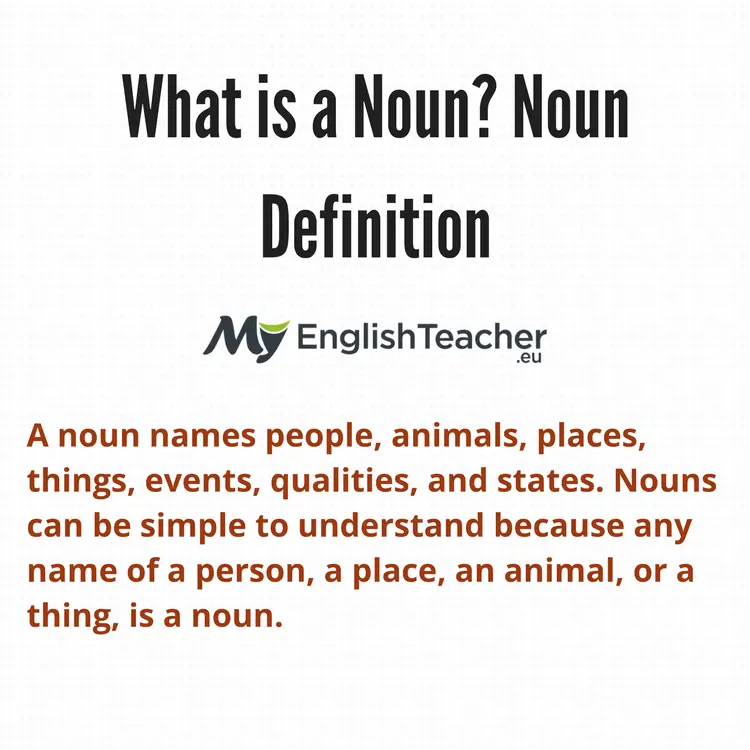Noun Definition
Everything that we can see and we can name are nouns. A noun names people, animals, places, things, events, qualities, and states. Nouns can be simple to understand because any name of a person, a place, an animal, or a thing, is a noun. But how about the qualities and states?
How about “bus stop”? Is bus a noun? Most sentences have nouns. They’re probably the most used of all the parts of speech. Nouns can have different functions and there are many types of nouns. We will start with main types of nouns.
Common
These name general nouns.
Example: teacher, doctor, chair, bird, home
They should not start with a capital letter, unless they are the first word of a sentence.
Proper
These name specific people, animals, things, places, events, qualities and states.
Example: Stephen, Brazil, Winter Olympic, etc.
They always start with a capital letter.
Compound
These are nouns that are made up of two or more words. Usually, it is composed of noun + noun, but there are other combinations. Look at the following combinations:
noun + noun: study table, bedroom
Example: I will have my bedroom cleaned.
adjective + noun: blackboard, hardware
Example: My computer is not working. I think it’s a problem with the hardware.
verb + preposition: check-out
Example: I have confirmed my booking for a standard room and I want a late check-out.
noun + prepositional phrase: mother-in-law
Example: My mother-in-law is going to live with us.
preposition + noun: underworld
Example: I can’t accept money from the underworld.
noun + adjective: truckful
Example: I ordered five truckfuls of fine stones.
Abstract
These name something that cannot be perceived by our five senses.
Example: happiness, freedom, intelligence, democracy, etc.
Collective
These are singular nouns that refer to a group of things as one whole.
Example: faculty, class, audience
When we talk about more than one person, place, things, events, etc., we need to use plurals. Noun plurals are usually created by adding an s. If the noun ends in ch, sh, x, s, z, we usually add es.
Example: dogs, beds, churches, wishes, boxes, buses, quizzes, etc.
A noun that ends in a consonant + y, they y will usually change to i then add es.
Example: family- families, city-cities, etc.
A noun ending in an f will usually replace the f with a v and then add es.
Example: knife-knives, wife-wives, thief-thieves, leaf-leaves, etc.
Note that there are exceptions to this rule, such as brief-briefs.
Plural nouns
That follow the above rules are called regular nouns, and irregular ones are those nouns that change their spelling for plurals.
Example: mouse-mice, child-children, man-men, person-people, foot-feet, goose-geese, tooth-teeth, louse-lice, cactus-cacti, appendix-appendices, ox-oxen, etc.
Countable Nouns
They are things that we can count. This kind of nouns have plural forms, like the ones we discussed above.
When a countable noun is singular, we need to use articles (a, an, the), or other determiners (my, his, her, our, this, that, etc.) with it.
Example: I want to eat an apple. We do not say: I want apple.
When a countable noun is plural, we can use it alone.
Example: I want to have oranges.
We can also use some and any with countable nouns.
Example: Do you have any pens?
Uncountable Nouns
They are substances, ideas, concepts, things, etc. that we cannot count. For example, we cannot count sugar, but we can count a bag of sugar.
Here are some uncountable nouns:
- Music, art, love, happiness
- Advice, information, news
- Furniture, luggage
- Rice, sugar, butter, water
- Electricity, gas, power
- Money, currency
We use singular verbs for uncountable nouns.
Example: Your furniture looks very nice.
We do not use indefinite articles (a/an) with uncountable nouns. We cannot say “an advice” or “a art”. However, we can say a piece of advice, a bottle of water, a sack of rice, etc.
We can also use some and any with uncountable nouns.
Example: Do you have any money?
When you learn a new word, it’s good to know whether it’s a countable or uncountable.
There are nouns that can be countable or uncountable, depending on their meaning.
Please look at the following examples:
- There is a hair in my coffee. (Hair is countable.)
- My dad doesn’t have much hair. (Hair is uncountable.)
- There are 6 lights in our living room. (Light is countable.)
- Can you close the windows? There’s too much light and I need to sleep. (Light is uncountable)



























